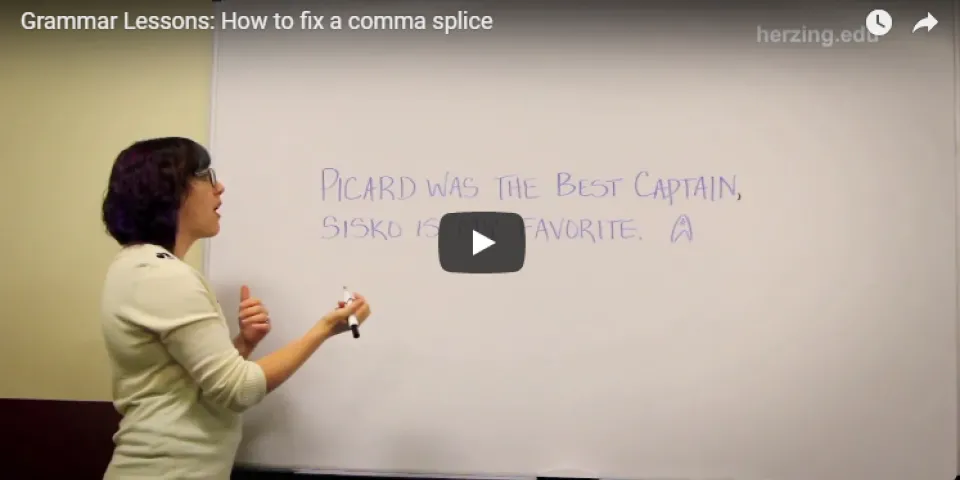Latest
Grammar Lesson: Comma Splices
Jun 27, 2018

Have you ever received feedback that your writing contains a comma splice? You might be wondering what a comma splice is and why it matters if you have one. As an English teacher, comma splices are the most common writing error that I see. They’re easy to make, and we tend to see them in casual writing, which makes them harder to recognize and avoid in academic writing.
What is a comma splice?
The first step to recognizing a comma splice is knowing the difference between dependent and independent clauses. An independent clause is a sentence that expresses a complete thought and contains a subject (who or what the sentence is about) and a verb (what the subject is doing).
For example:
Picard was the best captain.
You can have a phrase with a subject and verb that does not express a complete thought. Often, this occurs when the sentence starts with a conjunction:
Because Picard was the best captain.
A conjunction is a word, such as “and,” “but,” or “because,” that is used to join two thoughts together. “Because Picard was the best captain” is missing a second thought and is therefore incomplete.
A comma splice occurs when two independent clauses are connected by a comma:
Picard was the best captain, Sisko is my favorite.
“Picard was the best captain” and “Sisko is my favorite” are both independent clauses; therefore, this is a comma splice.
There are three ways to fix a comma splice.
1. Replace the comma with a period
Picard was the best captain. Sisko is my favorite.
This is the easiest fix, and it gives you two complete sentences. However, depending on the audience and context for your writing, these two sentences might need a transitional word or phrase to show how they work together. Replacing the comma in a comma splice with a period works best when your two clauses are two independent and individual thoughts and when it’s clear to your audience how the two clauses are related.
2. Replace the comma with a semicolon
Picard was the best captain; Sisko is my favorite.
This is grammatically correct, but your reader might get confused if it’s unclear how your two clauses are related. A semicolon should only be used when two independent clauses are so very closely related that they simply cannot be in separate sentences.
3. Turn one of the independent clauses into a dependent clause
Adding a conjunction after the comma makes the second clause dependent:
Picard was the best captain, but Sisko is my favorite.
Adding an introductory element makes the first clause dependent:
Even though Picard was the best captain, Sisko is my favorite.
Bonus tip: “However” sometimes acts like a conjunction, but it’s not one. It’s a conjunctive adverb, which is similar to a conjunction, but different. The biggest difference is that a clause starting with a conjunction is almost certainly a dependent clause (But Sisko is my favorite…), while a clause starting with a conjunctive adverb is almost certainly an independent clause (However, Sisko is my favorite).
This means that “Picard was the best captain, however Sisko is my favorite” is STILL a comma splice.
A comma splice in your writing makes your ideas feel rushed. Comma splices are sometimes used intentionally in artistic writing, like a novel, when a character’s thoughts are racing. However, in academic writing, they should be avoided so that each idea is given the weight it deserves and so that the reader understands how different ideas relate to each other.
Find Your Program At Herzing
Bureau of Labor Statistics (BLS), U.S. Department of Labor, Occupational Employment and Wage Statistics 2023 / Occupational Outlook Handbook 2022. BLS estimates do not represent entry-level wages and/or salaries. Multiple factors, including prior experience, age, geography market in which you want to work and degree field, will affect career outcomes and earnings. Herzing neither represents that its graduates will earn the average salaries calculated by BLS for a particular job nor guarantees that graduation from its program will result in a job, promotion, salary increase or other career growth.
Latest
Recent Blog Posts
Subscribe to our Newsletter
Get the latest news you need to know, from study hacks to interview tips to career advancement. Have it delivered right to your inbox biweekly.








